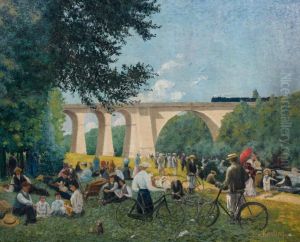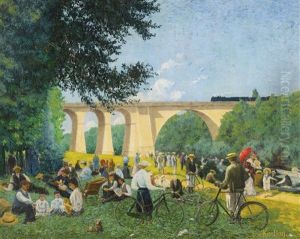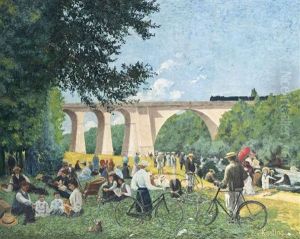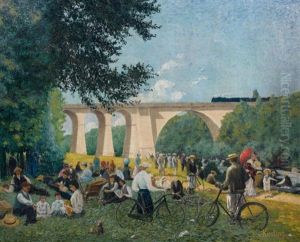Eugene Kissling Paintings
Eugène François Marie Joseph Devéria, known as Eugène Devéria (22 April 1805 – 3 February 1865), was a French Romantic painter. He is often confused with Eugène-Ernest Hillemacher or Eugène Isabey, but he was a separate individual with his own artistic contributions. Devéria was born in Paris, France, as the younger brother of the painter Achille Devéria. The brothers were part of the vibrant artistic scene of Paris in the early 19th century, which included figures such as Eugène Delacroix and Théodore Géricault.
Eugène Devéria gained recognition for his historical and religious paintings. One of his most famous works is 'The Birth of Henri IV' (1827), which was exhibited at the Salon and brought him to public acclaim when he was just 21 years old. This painting reflects the Romantic interest in dramatic and emotive historical subjects. His early success landed him significant commissions, and for a time, he was considered a leading painter of his generation.
Despite his early fame, Devéria's career faced challenges. His later works did not receive the same critical acclaim as his earlier pieces, and he struggled with financial instability. In 1839, he moved to Pau in southwestern France, shifting his focus away from grand historical scenes to more intimate family portraits and regional landscapes. Devéria converted to Catholicism in 1843, which also influenced the subjects of his later works, infusing them with a sense of religious devotion and contemplation.
In the 1850s, Devéria's health began to decline, and he moved to the Pyrenees for the betterment of his well-being. He spent his final years in relative obscurity, far from the Parisian art world that had once celebrated his talent. Eugène Devéria died on February 3, 1865. Although his reputation faded after his death, his early masterpieces, particularly 'The Birth of Henri IV', remain significant as examples of French Romantic painting. Devéria's work is characterized by its rich color, dramatic lighting, and emotional intensity, qualities that reflect the Romantic spirit of his time.



